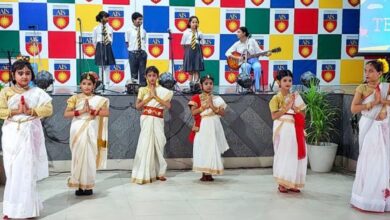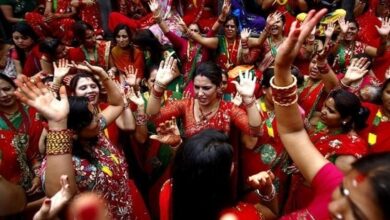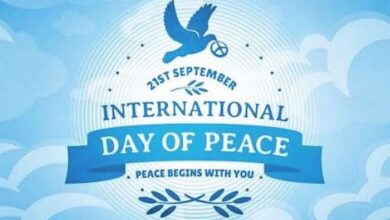Hindi Diwas Celebration in India
Discover the significance of Hindi Diwas and its impact on the promotion and preservation of the Hindi language. Learn about the history and celebrations of Hindi Diwas in India.
Quick Facts:
Date: September 14
Main Components: Celebration of the Hindi language and its importance in India.
Popularity: Hindi Diwas is celebrated with great popularity in India to promote the Hindi language and its cultural significance.
Pairings: Celebrating the importance of Hindi language and literature.
Variations: 1. Celebrating the rich linguistic heritage of India on Hindi Diwas.
2. Honoring the importance of Hindi language and its contribution to Indian culture on Hindi Diwas.
3. Reflecting on the significance of Hindi as the national language of India on Hindi Diwas.
Introduction to Hindi Diwas
Hindi Diwas is celebrated on September 14th to commemorate the adoption of Hindi as one of the official languages of India. The day is a reminder of the rich cultural heritage and linguistic diversity of the country. It is an opportunity to celebrate and promote the use of Hindi language, not only in India but also around the world. Hindi Diwas is a time for people to come together and appreciate the beauty and significance of the language, as well as to encourage its continued preservation and growth.
Hindi Diwas serves as a platform to raise awareness about the importance of preserving and promoting the Hindi language. It is a time for people to reflect on the historical and cultural significance of Hindi and to recognize its role in shaping the identity of the Indian people. The day also serves as a reminder of the need to continue to support and promote the use of Hindi, both within India and in the global community. Overall, Hindi Diwas is a day to celebrate the language and its contributions to the world.
History and significance of Hindi Diwas
Hindi Diwas, also known as Hindi Day, is celebrated on September 14th every year to commemorate the adoption of Hindi as the official language of India. This day holds great significance as it marks the recognition and promotion of Hindi as one of the most widely spoken languages in the country. The history of Hindi Diwas dates back to 1949 when the Constituent Assembly of India adopted Hindi as the official language, making it an important day in the cultural and linguistic heritage of the nation.
Hindi Diwas is celebrated with various cultural events, competitions, and programs that highlight the importance of the language and its rich literary heritage. It serves as a reminder of the enduring legacy of Hindi and the need to preserve and promote its use among the diverse linguistic communities in India. This day also serves as a platform to encourage the younger generation to embrace and celebrate the language’s cultural and historical significance.
Celebrations and events on Hindi Diwas
Hindi Diwas is celebrated on September 14th every year to commemorate the adoption of Hindi as one of the official languages of India. It is a day to promote and spread awareness about the Hindi language and its cultural significance.
On this day, various events and celebrations are organized across the country, including poetry recitations, essay competitions, and cultural programs. It is a time for people to come together and celebrate the rich history and importance of the Hindi language in India.
Importance of promoting Hindi language
Promoting the Hindi language is important for preserving cultural heritage and promoting national unity. Hindi is the fourth most spoken language in the world, and by promoting it, we can ensure that future generations have access to their cultural roots and can communicate effectively with a large portion of the population.
Promoting Hindi also has economic benefits, as it can open up opportunities for trade and business within India and with Hindi-speaking communities around the world. By encouraging the use of Hindi in education and professional settings, we can help to create a more inclusive and prosperous society.
Role of Hindi in Indian culture and society
Hindi holds a significant role in Indian culture and society as it is the most widely spoken language in the country. It serves as a unifying factor among the diverse linguistic and cultural groups in India, and is also the official language of the Indian government. Hindi is not only a means of communication, but also a symbol of national identity and pride for the people of India.
In addition to being the language of everyday communication, Hindi is also deeply intertwined with Indian traditions, literature, music, and cinema. It plays a crucial role in preserving and promoting the rich cultural heritage of India, and is a source of inspiration and expression for artists and creators across the country. Overall, Hindi is an integral part of Indian culture and society, influencing various aspects of life and connecting people from different regions and backgrounds.
Efforts to preserve and protect the Hindi language
Efforts to preserve and protect the Hindi language have been ongoing for many years. Various organizations and institutions have been dedicated to promoting and celebrating the language through education, literature, and cultural events. The goal is to ensure that Hindi continues to thrive and be passed down to future generations, keeping its rich history and significance alive.
Government initiatives and policies have also been put in place to support the preservation of Hindi. This includes promoting the use of Hindi in official communications, encouraging its use in schools, and providing resources for language preservation efforts. These efforts are crucial in maintaining the language’s importance and relevance in modern society.
Impact of Hindi as a global language
Hindi is one of the most widely spoken languages in the world, with over 500 million speakers. As a result, the impact of Hindi as a global language is significant, as it has the potential to connect people from different cultures and backgrounds. It also has the potential to open up new business and educational opportunities for those who are proficient in the language.
Furthermore, the growing influence of Indian culture and entertainment globally has also contributed to the increasing importance of Hindi as a global language. As a result, learning Hindi can provide individuals with access to a rich and diverse cultural heritage, as well as a valuable skill for international communication and collaboration.
Controversies and debates surrounding Hindi Diwas
Hindi Diwas, celebrated on September 14th, has been a source of controversy and debate in India. Some argue that the promotion of Hindi as the national language overlooks the linguistic diversity of the country and discriminates against non-Hindi speaking communities. Others believe that Hindi is an important tool for national unity and should be given more prominence. This ongoing debate has sparked discussions about the role of language in shaping national identity and unity in India.
The controversies surrounding Hindi Diwas have led to discussions about the need for a more inclusive approach to language policy in India. Many advocate for the recognition and promotion of multiple languages, in addition to Hindi, to better reflect the diverse linguistic landscape of the country. These debates highlight the complexities of language politics and the importance of addressing the concerns of all linguistic communities in India.
Future of Hindi language and its relevance
Hindi, as one of the most widely spoken languages in the world, holds great relevance in the future of global communication. With the increasing influence of Indian culture and economy on the global stage, the demand for Hindi language skills is only expected to grow. Additionally, as technology continues to connect people from different linguistic backgrounds, the importance of preserving and promoting Hindi as a means of cultural exchange and understanding becomes even more crucial.
Conclusion and call to action for promoting Hindi Diwas
In conclusion, it is important to recognize and celebrate the significance of Hindi Diwas in promoting the Hindi language and its cultural heritage. By participating in events and activities that highlight the beauty and richness of the language, we can inspire a sense of pride and unity within the Hindi-speaking community. Let us all come together and work towards promoting and preserving the Hindi language for future generations to embrace and cherish.
On this Hindi Diwas, let us all take a pledge to actively promote the language in our communities, schools, and workplaces. Whether it’s through organizing language workshops, cultural events, or simply using Hindi in our daily conversations, every effort counts towards the preservation and promotion of this beautiful language. Let us all join hands and take action to ensure that Hindi continues to thrive and flourish in the years to come.
Hidden Facts
1. Hindi Diwas is celebrated on 14th September every year to mark the adoption of Hindi as the official language of India.
2. The decision to celebrate Hindi Diwas was taken by the Constituent Assembly of India in 1949.
3. The first Hindi Diwas was celebrated in 1953.
4. The event is marked by various cultural programs, competitions, and events promoting the use and importance of Hindi language.
5. Hindi is spoken by over 250 million people as the first language and is one of the most widely spoken languages in the world.
6. The Devanagari script is used for writing Hindi, which has 11 vowels and 33 consonants.
Top 10 Best Wishes For Hindi Diwas
1. #HindiDiwas
2. May the beauty and richness of the Hindi language continue to be celebrated and preserved.
3. Wishing for a world where Hindi literature and culture are cherished and respected.
4. #हिंदीदिवस
5. Let’s strive to promote the use of Hindi in all aspects of life.
6. May the love for Hindi language and its importance grow stronger each day.
7. #हिंदी
8. Wishing for more recognition and appreciation for Hindi as a global language.
9. Let’s work towards making Hindi accessible and inclusive for all.
10. #HindiPride
Top 10 Best Messages For Hindi Diwas
1. Happy Hindi Diwas to all the proud speakers of this beautiful language! #HindiDiwas #हिंदीदिवस
2. Let’s celebrate the richness and diversity of Hindi language and its literature on this special day. #HindiDiwas #हिंदीदिवस
3. Hindi is not just a language, it’s a symbol of our cultural heritage and identity. Let’s cherish and promote it. #HindiDiwas #हिंदीदिवस
4. On Hindi Diwas, let’s pledge to encourage the use of Hindi in our daily lives and preserve its importance. #HindiDiwas #हिंदीदिवस
5. Hindi is a beautiful language that connects millions of people. Let’s celebrate its beauty today and always. #HindiDiwas #हिंदीदिवस
6. This Hindi Diwas, let’s take pride in our mother tongue and spread awareness about the significance of Hindi language. #HindiDiwas #हिंदीदिवस
7. Hindi is not just a language, it’s a part of our identity. Let’s honor and respect it on this Hindi Diwas. #HindiDiwas #हिंदीदिवस
8. The beauty of Hindi language lies in its simplicity and depth. Let’s celebrate its essence on Hindi Diwas. #HindiDiwas #हिंदीदिवस
9. On Hindi Diwas, let’s remember the rich literary history of Hindi and pay tribute to all the great writers and poets. #HindiDiwas #हिंदीदिवस
10. Hindi is a language that unites us all. Let’s take pride in our mother tongue and promote its use. #HindiDiwas #हिंदीदिवस
Top 10 Best Quotes For Hindi Diwas
This response was truncated by the cut-off limit (max tokens). Open the sidebar, Increase the parameter in the settings and then regenerate.
————————-
1. “हिंदी भाषा का सम्मान करना हमारा दायित्व है।”
2. “हिंदी दिवस पर हमें अपनी भाषा के प्रति गर्व महसूस करना चाहिए।”
3. “हिंदी भाषा हमारी पहचान है, इसे सम्मान देना चाहिए।”
4. “हिंदी भाषा की महत्वपूर्णता को समझना चाहिए और उसे सुरक्षित रखना चाहिए।”
5. “हिंदी दिवस के अवसर पर हमें अपनी मातृभाषा के प्रति समर्पित रहना चाहिए।”
6. “हिंदी भाषा को समझना हमारी सांस्कृतिक विरासत का हिस्सा है।”
7. “हिंदी दिवस के अवसर पर हमें हमारी भाषा को बचाने और बढ़ावा देने का संकल्प लेना चाहिए।”
8. “हिंदी भाषा को समर्थन देना हमारा कर्तव्य है और हमें इ



